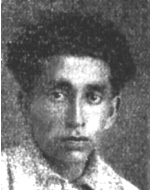Haripko, Tzvi
Son of Zahava and Israel-Yitzhak, was born on February 10, 1906 in the city of Vizna, Poland. From his youth he was a member of the He – Chaluts movement and a member of the “Shachariya” pioneering training commune (kibbutz hachshara). In 1929 he immigrated to Israel. Zvi was energetic and passionate, his eyes black and burning, his hair black and curly, his build delicate but firm. Upon his arrival in Israel, he fulfilled his ambition and joined the kibbutz movement and settled with the first settlers of Ramat Hakovesh. The first years in a desolate place, wedged between hostile Arab settlements, were difficult, but Zvi, who was active in all areas of the agriculture, willingly tolerated the suffering of the work and even encouraged his friends with a smile and a joke. “There is nothing” – which was always in his mouth. He soon became one of the main figures in the farmyard, in the bakery, in the orchard, carrying the burden with devotion, concern and joy. The Arabs stole and assaulted them, devoted themselves to the security of the place, learned the lives of their neighbors and their tongues, became friendly with them and admired them with courage. The Arabs worshiped the rider alone on his mare and the rifle on his shoulder, without fear and cowardice. They called him “out of the bill,” thinking him one of the oldest and most trained policemen. During a robbery attack, Zvi was wounded and his arm was silent. However, he did not give up his activities, and in one hand he would perform his duties completely. He was loved and loved by his friends, and had a positive influence on his surroundings. Was boundlessly devoted to his family and was typical of his appearance with his two sons on his shoulders and holding them in one hand. And so his friends described him: “Our old guard, who is full of healthy people and good humor.” On 9.6.1948, during the heavy shelling during the battle for Ramat Hakovesh, he was seriously injured and died on the way to the hospital, and was brought to rest at the Ramat Hakovesh cemetery.
